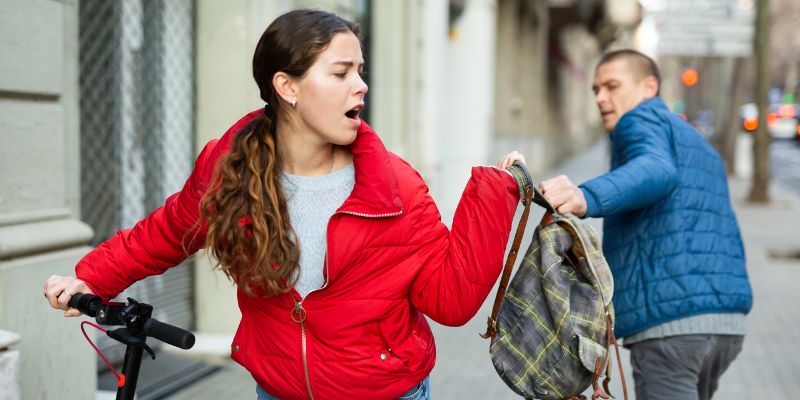Have you ever had terrible thoughts about getting scammed while travelling? Have you ever heard of tourist stories that made them fall in rates much higher than usual, lost their precious belongings, or even been scammed? Unfortunately, scams exist in almost every country. You can avoid most scams with a bit of awareness and preparation. Let's discuss some of the most common travel scams and how to protect yourself.
Have you ever had terrible thoughts about getting scammed while travelling? Have you ever heard of tourist stories that made them fall in rates much higher than usual, lost their precious belongings, or even been scammed? Unfortunately, scams exist in almost every country. You can avoid most scams with a bit of awareness and preparation. Let's discuss some of the most common travel scams and how to protect yourself.
1. Fake Taxi Scams
Taxis are among the most common target vehicles where tourists are scammed. Some dishonest drivers will say that the meter is broken, take unnecessarily long routes, or argue that the destination is "closed" to take you somewhere from which they earn a commission.
How to Avoid It:
1.Prefer official taxis or ride-hailing apps like Bolt, Uber, or Lyft.
2.If you're taking a standard cab, use the meter or settle on a fare before you leave.
3.To prevent getting overcharged, find out the official taxi prices in advance.
2. "Closed Attraction" Scam
When you visit a well-known temple museum or attraction, you are greeted by a friendly stranger who explains that the place is closed today but shows you to a commercial space because they get a commission from your visit.
How to Avoid It:
1.Check the official website for operating hours before going out.
2.Always verify whether attractions are closed by consulting with official staff members.
3.Politely refuse the offer.
3. Atm And Currency Exchange Scams
Travellers might need to exchange currency or make withdrawals in a new country. While exchanging money, they become a target of scammers. ATMs may be fitted with skimming devices that steal payment details, while exchange offices offer poor exchange rates and hidden charges.
How to Avoid It:
1.Use the bank's ATM services since street-based machines expose users to potential security risks.
2.When entering your PIN, protect the numeric keypad from view.
3.Check that you received money and count it before leaving any exchange office.
4.Refuse all money transactions from street vendors and "helpful" strangers when travelling abroad.

4. Fake Police Officers
In some nations, tourists become targets of fake police officers who claim that they violate rules to get tourists to pay immediate spot fines. They demand your passport and keep it unless you make the payment.
How to Avoid It:
1.Always verify the identity of anyone calling themselves police by asking to see official identification.
2.Your passport should only be provided to genuine police officers working at official police stations.
3.When someone asks for an acceptable payment, insist they visit the closest official police station to validate the allegation.
5. Friendship Bracelet Or Free Gift Scam
Tourist destinations frequently become victims of this fraud when individuals distribute "free" accessories, such as bracelets, roses or souvenir items. They ask for payment or create a scene after you accept something from them. They also make you experience feelings of guilt for taking money from you.
How to Avoid It:
1.Acceptance of gifts from unknown people must be avoided, no matter how friendly they look.
2.When someone attempts to place a bracelet around your wrist, you must withdraw your hand and leave rapidly.
3.Avoid discussing anything with street vendors who try to give out unsolicited free stuff.
6. Fake Hotel Calls
When you stay at night, your hotel staff calls to verify your credit card information. This is another tactic criminals use to steal your card information for a scam.
How to Avoid It:
1.Always reject telephone requests for your credit card details.
2.If you encounter a telephone call from unknown sources, hang up and visit reception to verify the situation.
3.All your passports and valuable possessions must be stored inside the hotel safe.
7. The "Helpful" Local
Tourists busy in crowded areas often encounter scammers who offer help to distracted victims while a second criminal quickly steals their belongings.
They work in groups and distract people using different tactics, such as accidentally dropping something on their dress or asking for directions. They can also offer to do a photoshoot.
How to Avoid It:
1.Hold the zip-lock bag tightly to keep your belongings safe when travelling through crowded areas.
2.Keep your important possessions out of reach by not placing them in open pockets for quick access.
3.Pay attention to friendly individuals who start conversations unexpectedly with you.
8. The Fake Tour Guide
Scammers can be found in different tourist areas. They pretend to be official tour guides and charge entry fees for free areas.
How to Avoid It:
1.Investigate the entry requirements for every attraction before your visit.
2.Tourists should book their trips solely through trustworthy travel companies.
3.When someone unexpectedly requests payment, politely refuse and visit the official entrance point for accurate information.

9. Rental Scams
Car, bike, and jet ski rentals frequently have these incidents. After you return the rented vehicle, the owner makes false claims about vehicle damage to extract enormous repair costs from you.
How to Avoid It:
1.It is safe to record clear images of the rental object before and after handing it back to the owner.
2.Always choose rental services from well-known firms which maintain excellent customer reviews.
3.You should never give your passport as security because scammers force you to take a payment to them.
10. Fake Charity Scams
Dense tourist locations are full of fake monks, children and charity workers who often ask for donations. You might come across people who will present false petitions and wear religious robes to take sympathy from you.
How to Avoid It:
1.Give your charity to those companies that are registered.
2.If you find any aggressive appeals for donation, it is safe to avoid them.
3.If you're unsure, politely say no and move towards your destination.
Final Thoughts
Making incredible memories is the aim of travelling, and it should be free from scams. You can enjoy your holidays without falling into traps by being vigilant and active. By being informed and perceptive, you can easily avoid typical tourist traps and have a stress-free holiday. Always trust your instincts when engaging with strangers, double-check facts, and use care.
Although most locals are hospitable and cooperative, some shady characters exploit tourists. Be smart, be alert, and move with assurance!
- Share this article:
-
![DIY Kitchen Makeover: Affordable Upgrades To Transform Your Space]() Home & Garden
Home & Garden - DIY Kitchen Makeover: Affordable Upgrades To Transform Your SpaceIs your kitchen outdated? Do you wish to revamp the heart of your home? Kitchens are a pious living space where you cook, have amazing conversations, and make memories. But they can also get cluttered very quickly. With just a touch of DIY makeovers, you can lift your kitchen. We'll explore affordable DIY kitchen upgrades that can rejuvenate your space, boost functionality, and reflect your style. Let’s get going, shall we?
-
![Managing Chronic Conditions in Senior Living]() Health & Medical Treatment
Health & Medical Treatment - Managing Chronic Conditions in Senior LivingAs we age, the importance of staying healthy takes centre stage. For seniors grappling with chronic conditions such as diabetes, arthritis, or heart disease, managing these health hurdles can often seem daunting. Yet, with the right strategies and support, it is possible to lead a fulfilling life. In this article, I will provide practical tips and insights aimed at helping seniors and their families confidently navigate this journey.








